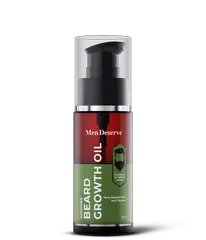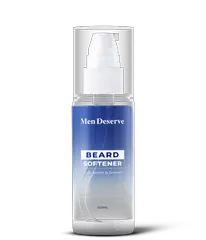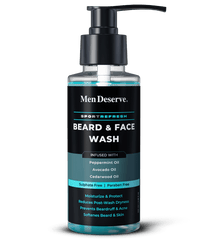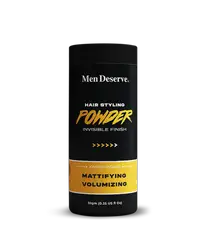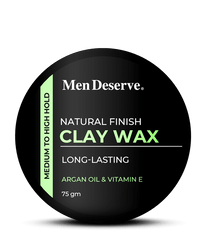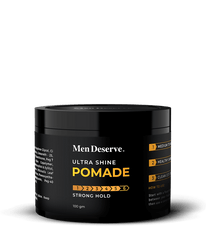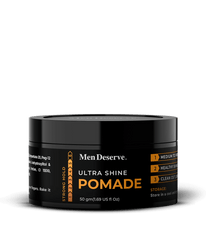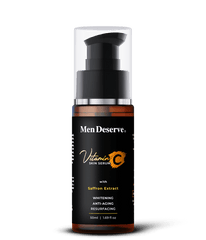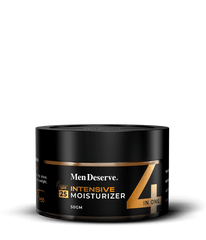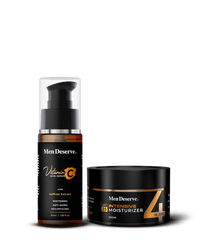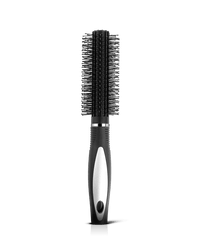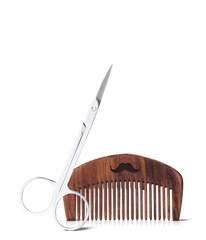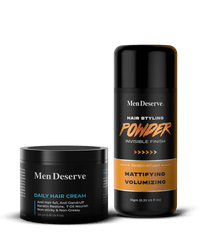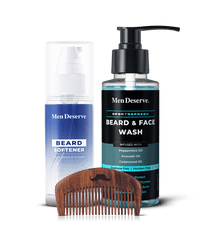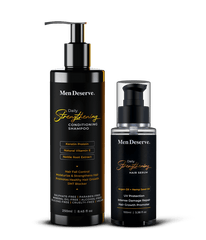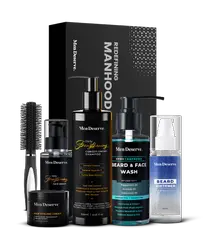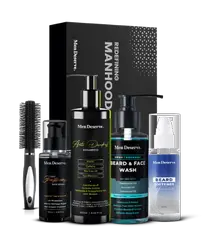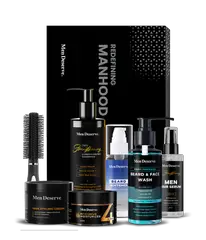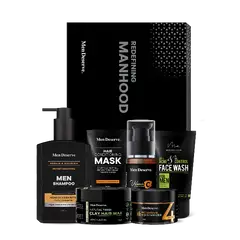Hydration and Nutrition for Men Skincare
When it comes to skincare, many men focus on products like cleansers, moisturizers and aftershaves. However, an often overlooked factor that plays a crucial role in skin health is diet. Just like any other part of your body, your skin thrives on the right nutrition. Understanding the connection between diet and skin health can lead to clearer, healthier skin and even slow the signs of aging.
In this article, we’ll explore how nutrition impacts your skin, the foods that promote a healthy complexion and why hydration is key to glowing, youthful skin?
Why Your Diet Matters for Skin Health?

Image Credit: @facecliniclondon
Your skin is your body's largest organ and it reflects the overall health of your body. The food you consume affects the condition, tone and texture of your skin. A diet rich in antioxidants, vitamins, minerals and healthy fats can enhance skin elasticity, reduce inflammation and protect against environmental damage. On the flip side, poor nutrition can lead to issues like acne, dryness, premature aging and other skin conditions.
For men, the connection between skin health and nutrition is becoming a hot topic as more people realize that good skincare isn’t just about what you apply externally - what you eat matters just as much.
Also Read: Skincare and Mental Health
Essential Nutrients for Healthy Skin
1. Antioxidants Food for Skin

Image Credit: @fruitsmart
Antioxidants protect your skin from free radical damage caused by pollution, UV rays and even stress. Foods rich in antioxidants can help keep your skin looking youthful and reduce the appearance of wrinkles.
Key Foods: Berries (blueberries, strawberries), dark chocolate, spinach and kale.
2. Omega 3 Fatty Acids for Skin

Image Credit: @goodnesscare
Omega 3 Fatty Acids are essential for maintaining your skin's lipid barrier, which helps keep your skin hydrated and plump. These healthy fats reduce inflammation, helping to prevent conditions like acne, eczema and psoriasis.
Key Foods: Fatty fish (salmon, mackerel), walnuts, flaxseeds and chia seeds.
3. Vitamin C Food for Skin Health

Image Credit: @dermaessentia
Vitamin C plays a vital role in collagen production, which keeps your skin firm and elastic. It also protects your skin from sun damage and can reduce pigmentation and dark spots.
Key Foods: Oranges, kiwi, bell peppers, broccoli and strawberries.
4. Vitamin E Food for Skin

Image Credit: @jaivique
Vitamin E is a powerful antioxidant that protects your skin from UV damage and keeps it moisturized. It also aids in repairing damaged skin cells.
Key Foods: Almonds, sunflower seeds, avocados and spinach.
5. Zinc Rich Food for Men

Image Credit: nutritionsource
Zinc helps regulate the production of oil in the skin and can speed up the healing of damaged tissues. It is particularly effective in reducing acne and preventing breakouts.
Key Foods: Oysters, lean beef, pumpkin seeds and chickpeas.
6. Beta Carotene Rich Foods

Image Credit: @everyhealth
Beta-carotene, a precursor to vitamin A, is known for its skin-protective properties. It helps shield your skin from sun damage and promotes a healthy, natural glow.
Key Foods: Carrots, sweet potatoes and red bell peppers.
Why Men Should Prioritize Hydration?

Image Credit: @muscleandfitness
Men tend to have thicker skin than women, which means it can retain moisture better. However, this also makes the effects of dehydration more pronounced when it happens. Drinking enough water flushes toxins from your system, helps maintain skin elasticity and prevents dry, flaky patches.
Role of Skin Hydration Health Benefits

Image Credit: @dapperandgroomed
Hydration is one of the most critical aspects of maintaining healthy skin. When your skin is properly hydrated, it looks plumper, more vibrant, and has fewer visible fine lines and wrinkles. Dehydration, on the other hand, can make your skin appear dull, dry and more prone to irritation and aging.
How to Stay Hydrated for Optimal Skin Health?
1. Drink Plenty of Water

Image Credit: @phwcbermuda
The simplest and most effective way to stay hydrated is to drink sufficient water throughout the day. Aim for at least eight 8 ounce glasses (about 2 liters) daily, but individual needs may vary based on factors like activity level, climate and overall health. Carry a reusable water bottle to track your intake and remind yourself to drink water regularly, especially during physical activities or in hot weather.
2. Incorporate Hydrating Foods

Image Credit: @healthline
Many fruits and vegetables have high water content and can significantly contribute to your overall hydration. Foods like cucumbers, watermelon, oranges, strawberries and leafy greens are excellent choices. Snacking on these hydrating foods not only boosts your water intake but also provides essential vitamins and minerals that support skin health.
3. Limit Dehydrating Beverages

Image Credit: @spicysaltysweet
While beverages like coffee and alcohol can be enjoyable, they can also contribute to dehydration. Caffeine and alcohol have diuretic effects, which means they increase urine output and can lead to fluid loss. If you consume these drinks, make sure to balance them with extra water. Consider limiting your intake of sugary and carbonated beverages as well, as they can lead to inflammation and skin issues.
4. Use a Humidifier at Office/Home

Image Credit: @nbcnews
In dry environments, such as during winter months or in air conditioned spaces, the air can strip moisture from your skin. Using a humidifier in your home or workspace adds moisture to the air, helping to keep your skin hydrated. This is especially beneficial while you sleep, as it can prevent nighttime dryness and improve overall skin texture.
5. Maintain a Consistent Skincare Routine

Image Credit: @yesmadam
In addition to drinking water, a proper skincare routine can help lock in moisture. Use a hydrating cleanser to avoid stripping your skin of natural oils, followed by a moisturizer containing hydrating ingredients like hyaluronic acid or glycerin. Regularly applying these products after washing your face ensures that your skin retains moisture, preventing dryness and promoting a healthy complexion.
Also Read: Korean Skincare for Men
Foods to Avoid for Better Skin
Just as some foods can improve your skin, others can have the opposite effect. A diet high in sugar, processed foods, and unhealthy fats can lead to breakouts, dullness, and premature aging.
1. Sugary Foods

Image Credit: @humnutrition
High sugar intake can lead to an increase in insulin levels, which may trigger the production of oils in the skin and lead to acne breakouts. Sugary foods, such as candies, pastries and sweetened beverages can also contribute to inflammation and glycation, a process that damages collagen and elastin causing premature aging.
2. Processed Foods

Image Credit: @health
Processed foods often contain unhealthy fats, additives and preservatives that can wreak havoc on your skin. These foods are typically low in nutrients and can lead to inflammation and skin issues. Examples include fast food, packaged snacks and ready to eat meals. Instead, opt for whole, unprocessed foods to nourish your skin.
3. Dairy Products

Image Credit: @healthline
For some men, dairy can exacerbate acne and other skin conditions. Milk, cheese and yogurt may increase oil production and cause inflammation in certain people. If you notice breakouts after consuming dairy, consider reducing your intake and opting for plant based alternatives.
4. Fried and Fast Foods

Image Credit: @health
Fried foods are typically high in unhealthy trans fats, which can lead to inflammation and worsen skin conditions like acne and eczema. Foods like French fries, fried chicken and doughnuts can also contribute to oily skin and clogged pores. Instead, choose healthier cooking methods such as baking, grilling or steaming.
5. Refined Carbs

Image Credit: @eatthis
Refined carbohydrates, such as white bread, pasta and pastries can spike blood sugar levels leading to increased insulin and oil production. This can cause breakouts and other skin issues. Opt for whole grain alternatives, which are lower on the glycemic index and provide more nutrients.
6. Excessive Alcohol

Image Credit: @cosmedica
Excessive alcohol consumption can dehydrate the skin, leading to a dull complexion and the appearance of fine lines. Alcohol can also cause inflammation and worsen skin conditions like rosacea. Moderation is key; if you choose to drink, do so in moderation and always hydrate afterward.
7. Salty Foods

Image Credit: @medicalnewstoday
High sodium intake can lead to water retention and puffiness, particularly around the eyes. Processed snacks, canned soups and fast food are typically high in salt, which can negatively impact your skin's appearance. Instead, try to limit salt intake and opt for fresh herbs and spices for flavor.
8. Spicy Foods

Image Credit: @crimsoncoward
While not an issue for everyone, spicy foods can trigger redness and irritation in sensitive skin types. If you notice that spicy dishes cause flare ups or discomfort, it might be best to limit your intake.
9. Excessive Caffeine

Image Credit: @medicalnewstoday
While moderate caffeine consumption can be fine, excessive amounts can lead to dehydration, which can dry out the skin and make it look less vibrant. Be mindful of your caffeine sources, such as coffee, energy drinks and sodas, and balance them with plenty of water.
10. Certain Oils

Image Credit: @treehugger
While healthy fats are crucial for skin health, some oils can cause breakouts or irritate the skin. Oils high in omega 6 fatty acids, such as corn and soybean oil, can promote inflammation when consumed in excess. Instead, focus on incorporating healthy fats from sources like avocados, olive oil and fatty fish, which are more beneficial for skin health.
Shop the Best Skincare Products!
Final Thoughts
As men become more aware of the importance of skincare, focusing on the role of diet in maintaining skin health is essential. The connection between what you eat and the condition of your skin is undeniable.
A diet rich in antioxidants, healthy fats, and essential vitamins can go a long way in improving your complexion, reducing acne, and preventing the signs of aging. Combine a nutrient-rich diet with proper hydration, and you’ll see noticeable improvements in the health and appearance of your skin.
Take care of your skin from the inside out, and remember that skincare isn’t just about grooming or products - it’s a lifestyle choice that starts with your plate.
Join our WhatsApp Channel to Stay Updated!
FAQs: Hydration & Nutrition for Men’s Skincare
1. Which food is best for men's skin?
When it comes to nutrition for healthier skin, men should focus on foods rich in antioxidants, healthy fats and essential vitamins. Incorporating fatty fish, such as salmon and mackerel provides omega 3 fatty acids, which help reduce inflammation and maintain skin hydration. Fresh fruits and vegetables, particularly berries, citrus fruits and leafy greens are packed with antioxidants and vitamins like C and E, crucial for skin repair and protection. Additionally, nuts and seeds, such as almonds and sunflower seeds offer a good source of vitamin E and zinc, both beneficial for skin health. A balanced diet emphasizing whole, unprocessed foods will promote a radiant complexion and overall well being.
2. What is a good skincare routine for men?
A solid skincare routine for men typically involves four key steps: cleansing, exfoliating, moisturizing and protecting. Begin with a gentle cleanser suited to your skin type to remove dirt and impurities without stripping natural oils. Exfoliating 1-2 times a week helps remove dead skin cells, promoting a smoother texture and brighter appearance. After cleansing, apply a good moisturizer to hydrate and lock in moisture; look for products containing hyaluronic acid or glycerin for optimal hydration. Finally, don’t forget sunscreen during the day, as protecting your skin from harmful UV rays is crucial in preventing premature aging and skin damage.
3. How to improve skin health for men?
To improve skin health, men should prioritize a balanced approach that includes a nutritious diet, consistent skincare routine and lifestyle adjustments. Focus on eating whole foods rich in vitamins, minerals and healthy fats while avoiding excessive sugar and processed foods that can lead to skin issues. Staying hydrated by drinking plenty of water throughout the day is essential for maintaining skin elasticity and moisture. Additionally, incorporating regular exercise can boost circulation and promote healthy skin. Getting adequate sleep and managing stress are also critical, as they significantly impact skin health and appearance.
4. Which vitamin is best for men's skin?
Vitamin C is often considered one of the best vitamins for men's skin due to its powerful antioxidant properties and its role in collagen production. Collagen is essential for maintaining skin elasticity and firmness, helping to reduce the appearance of wrinkles. Additionally, Vitamin E complements vitamin C by providing further protection against oxidative stress and supporting skin hydration. B vitamins, particularly B3 (niacinamide), also play a crucial role in improving skin tone and texture, making them important for a well-rounded skincare regimen.
5. How do men get clear skin?
To achieve clear skin, men should adopt a holistic approach that combines a healthy diet, proper skincare and lifestyle changes. Start by following a consistent skincare routine that includes cleansing, exfoliating, and moisturizing, tailored to your skin type. Incorporating skin friendly foods such as fruits, vegetables, nuts and fatty fish can help nourish your skin from the inside out. Staying hydrated is crucial; aim for at least eight glasses of water a day to keep your skin plump and reduce breakouts. Avoiding smoking, limiting alcohol intake and managing stress through exercise or mindfulness techniques can also contribute significantly to achieving and maintaining clear skin.
6. Which skin type is best for men?
There isn't a "best" skin type for men, as each skin type: oily, dry, combination, and sensitive has its unique characteristics and requires specific care. Oily skin can benefit from products that help control excess sebum, while dry skin needs more moisturizing formulations. Combination skin may require a tailored approach, using different products for different areas of the face. Sensitive skin necessitates gentle, fragrance free products to avoid irritation. Understanding your skin type is crucial for selecting the right products and establishing an effective skincare routine that meets your specific needs.
7. How to hydrate skin for men?
To hydrate the skin effectively, men should begin by drinking adequate amounts of water throughout the day, aiming for at least eight glasses. This internal hydration helps maintain skin elasticity and moisture levels. Topically, applying a good moisturizer immediately after cleansing can lock in hydration. Look for moisturizers that contain hyaluronic acid, glycerin or ceramides, as these ingredients attract and retain moisture in the skin. Additionally, using a hydrating serum or facial mist can provide an extra boost of hydration, especially in dry environments or after physical activity.
8. What skincare ingredient is best for hydration?
Hyaluronic acid is one of the best skincare ingredients for hydration. Known for its ability to hold up to 1,000 times its weight in water, it draws moisture from the environment into the skin, making it incredibly effective for keeping the skin plump and hydrated. Other beneficial ingredients include glycerin, which acts as a humectant to attract moisture and ceramides which help restore the skin barrier and prevent moisture loss. Incorporating products with these ingredients into your skincare routine can significantly improve skin hydration levels.
9. Can men use hydrating cleansers?
Absolutely, Men can and should use hydrating cleansers, especially if they have dry or sensitive skin. Hydrating cleansers are formulated to remove impurities without stripping the skin of its natural oils, helping to maintain moisture levels. Look for cleansers that contain gentle ingredients like aloe vera, glycerin or hyaluronic acid which can cleanse effectively while providing hydration. Using a hydrating cleanser can set the stage for a healthy skincare routine, leaving the skin feeling fresh, clean, and moisturized without the tightness often associated with traditional cleansers.






